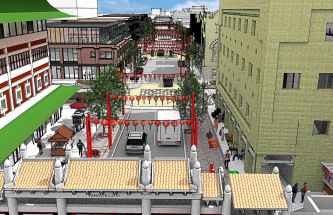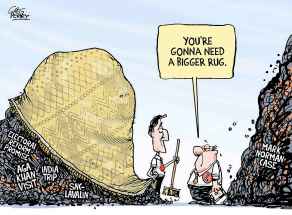Hospital reorganization plan appears hobbled
Read this article for free:
or
Already have an account? Log in here »
To continue reading, please subscribe:
Monthly Digital Subscription
$0 for the first 4 weeks*
- Enjoy unlimited reading on winnipegfreepress.com
- Read the E-Edition, our digital replica newspaper
- Access News Break, our award-winning app
- Play interactive puzzles
*No charge for 4 weeks then price increases to the regular rate of $19.00 plus GST every four weeks. Offer available to new and qualified returning subscribers only. Cancel any time.
Monthly Digital Subscription
$4.75/week*
- Enjoy unlimited reading on winnipegfreepress.com
- Read the E-Edition, our digital replica newspaper
- Access News Break, our award-winning app
- Play interactive puzzles
*Billed as $19 plus GST every four weeks. Cancel any time.
To continue reading, please subscribe:
Add Free Press access to your Brandon Sun subscription for only an additional
$1 for the first 4 weeks*
*Your next subscription payment will increase by $1.00 and you will be charged $16.99 plus GST for four weeks. After four weeks, your payment will increase to $23.99 plus GST every four weeks.
Read unlimited articles for free today:
or
Already have an account? Log in here »
Hey there, time traveller!
This article was published 13/05/2019 (2405 days ago), so information in it may no longer be current.
It is getting increasingly hard to believe Dr. David Peachey actually believes what he is saying.
The architect of a controversial plan to reorganize Winnipeg hospital services, Peachey made himself available to journalists late last week to declare the Progressive Conservative government of Manitoba may need to slow down the process of emergency department closures at Concordia (scheduled for end of June) and Seven Oaks General (September).
To some extent, it was an anti-climatic statement: Premier Brian Pallister and his cabinet ministers have been signalling for weeks now deadlines for the ER closures may not be set in stone.
However, what Peachey lacked in hard news, he more than made up for in total nonsense.
After conceding Concordia is not ready to meet its early summer deadline, Peachey maintained he was confident his original vision for Winnipeg hospitals was still on target: “The timelines may be off, but the plan is right.”
That is the exact moment when, if you look closely at Peachey as he addressed reporters, it gets harder and harder to believe he believes what he just said. In fact, he begins to look less like an independent consultant and more like a political prisoner being forced to read a rebel manifesto under threat.
How else can we explain the claims he made?
With a straight face, Peachey argued the schedule for ER closures he proposed more than two years ago has been disrupted by recent changes in demographics: a rise in elderly people (generally less healthy) and a decline in younger people (generally more healthy). True to those trends, the five ERs that remain open in Winnipeg have recorded spikes in patient visits.
There are some huge problems with this analysis.
First, the trends he refers to have been at work in Manitoba and Canada long before Peachey first proposed the closure of three city ERs.
He acknowledged the threat posed by demographics in 2017, when he delivered his final report to the Tory government, writing “an overall increasing population and, in particular, an increasing older population” would lead to “a continuing increase in the demand for inpatient and ambulatory internal medicine services.”

At the time, there were six ERs in Winnipeg. Peachey’s theory was fewer, better-outfitted ERs would outperform a larger number of poorly equipped ERs. On its face, and given the performance of Winnipeg ERs in national assessments for wait times, that theory is essentially sound.
The trick was always going to be finding the sweet spot: the right number of ERs for a city that is growing and changing. His comments last week suggest he has swung and missed.
The problem here is not the timeline, it is capacity. In other words: the plan is not right.
A delay in executing the hospital reorganization can only help produce a better outcome if it is accompanied by other changes such as (theoretically) cancelling the closure of Concordia’s ER. Without an adjustment to the plan to address capacity, it seems unlikely the original blueprint will ever produce its desired results.
There are other concerns to consider.
The biggest problem for the architects of reorganization (and one of the reasons why the timelines are messed up) has been a failure to get a buy-in from nurses.
The shuffling of the hospital deck has meant huge changes in how, where, and when nurses will be expected to work. Angry about the disruption, and what they claim is a lack of consultation, nurses are pushing back.
The results are dangerous staffing shortages and skyrocketing overtime. If this continues, it would make the hospital reorganization as envisioned by Peachey nearly impossible to achieve.
The level of anger in the nursing community should not come as a surprise. On May 2, more than 1,000 nurses gathered at the Manitoba legislature to protest hospital reorganization. The anger continued last week, when several hundred protesters gathered outside Concordia to demand its emergency department remain open.
Remarkably, despite clear evidence nurses are mad as hell, Peachey had the temerity to claim last week there was “an absolutely consensus” among hospital administrators and front-line staff “that the plan is right.”
Peachey is not misreading the people he talked to; he appears to be misrepresenting them for political purposes. That is going to continue to erode both his credibility and the credibility of his vision for the Winnipeg hospital system.
It is hard to know where things will go from here.
Rumours abound Pallister, keen to pull the trigger on a snap election, may indefinitely delay ER closures at Seven Oaks and Concordia out of fear it will leave his Winnipeg MLAs vulnerable. You can expect more announcements related to hospital reorganization this month, maybe even this week, as the premier tries to find a position he can defend on the campaign trail.
Pallister has repeatedly promised his Tory government would be known as the only one with the courage to heal the health-care system. Given recent events, the premier should be a little concerned his government will instead be known as the one that weakened an already weak system.
dan.lett@freepress.mb.ca

Born and raised in and around Toronto, Dan Lett came to Winnipeg in 1986, less than a year out of journalism school with a lifelong dream to be a newspaper reporter.
Our newsroom depends on a growing audience of readers to power our journalism. If you are not a paid reader, please consider becoming a subscriber.
Our newsroom depends on its audience of readers to power our journalism. Thank you for your support.











